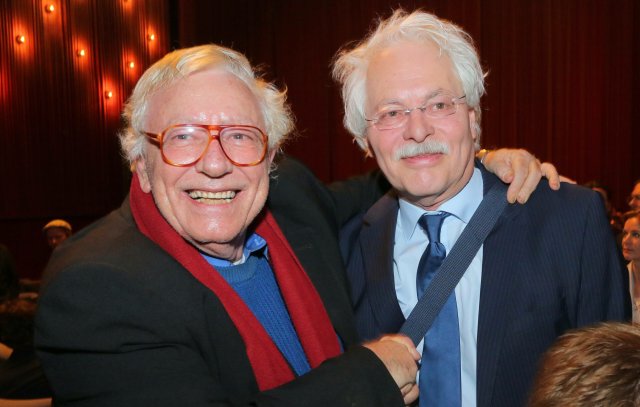Stefan Jerzy Zweig (l.) at the premiere of the new film version of “Naked Among Wolves” at the Delphi Filmpalast in Berlin, 2015
Photo: Imago/Tinkeres
Just imagine: someone barely survived the murderous German-fascist anti-Semitism and has to apologize for it to future generations. It wasn’t enough that, like millions of former fellow sufferers, he too was haunted by traumatic memories, and like millions of other Shoah survivors, he asked himself why he and not his relatives were lucky enough to have escaped the Nazis’ madness of annihilation… No, he was with them faced with a disgusting, cynical, irreverent, inhumane accusation of being able to enjoy life because another child was gassed instead of him. He owes his happiness to a “sacrificial swap,” thanks to the mercy of “red kapos” who were worse than the SS. So bleated historians and writers who, after 1990, made it their mission to deconstruct and delegitimize an anti-fascist, communist “myth” and were often spread by all kinds of media.
Stefan Jerzy Zweig was almost broken by it. And yet he knew how to defend himself bravely. Every time he was in Berlin, at a trial against the slanderers and falsifiers of history, to defend his honor and at the same time that of his rescuers, he also stopped by the editorial office of this newspaper. You could see how much the self-aggrandizing claims of historical ignoramuses affected, outraged, upset and hurt him. He won against the then director of the Buchenwald Memorial, Volkhard Knigge, who came from Bielefeld, as well as against Hans Joachim Schädlich, who accused him of clinging to a communist legend in his novel “Anders”.
Born on January 28, 1941 in Krakow as the son of the lawyer Zacharias Zweig and his wife Helena, he spent the first three years of his life in the ghetto with his parents and sister Sylwya and came to Buchenwald with his father at the beginning of August 1944, hidden in a backpack, where The illegal camp resistance, namely the prisoners Willi Bleicher, capo of the securities room, and Robert Siewert, capo of the construction detail, took care of him as far as possible, two former communists who, by the way, were not considered loyal to the line. Yes, they “corrected” death lists. The same thing happened elsewhere too. The illegal resistance fighters did not value lives, but rather chances of survival. Desperate humanity in the lion’s den. Jerzy’s name was initially on the list of the “transport” to Auschwitz that left Buchenwald on September 25, 1944, which was then replaced by the name of the 16-year-old Sinto Willy Blum. His nine-year-old brother Rudolf was on the list and, according to reports from survivors, was said to have repeatedly called for the older man out of fear of death, who then decided to accompany him on the journey into the unknown… The Berlin historian Annette Leo, daughter of the German Resistance fighter Gerhard Leo, researched the history of the murdered Blum puppeteering family and memorialized Willy in particular in her book “The Child on the List.”
Jerzy also lost his mother and sister in Auschwitz. Zacharias Zweig and his son experienced the self-liberation of the camp on Ettersberg near Weimar on April 11, 1945 and the arrival of the US Army shortly afterwards. After Jerzy initially had to be treated for tuberculosis in Switzerland, he lived with his father in Israel. The father worked in the Ministry of Finance, their son graduated from high school, completed military service and began studying mathematics, which he later continued in France, in Lyon. Father and son only found out about the novel “Naked Among Wolves” by Bruno Apitz (1958), in which Jerzy’s story is processed literary, with (of course) fictional elements, and made into a film by Frank Beyer (1963), when journalists from the (East Berlin) » BZ am Abend” were looking for the real “Stefan Cyliak”. Charlotte Holzer, a surviving member of the Jewish-communist resistance group around Herbert and Marianne Baum, was able to find out the branch’s address in Tel Aviv through her son-in-law. Zacharias Zweig wrote to her after he now knew about the novel: “Yes, that’s how it was, I never thought it would all be brought to life like this again.”
Shortly afterwards, Jerzy celebrated his 23rd birthday in Stuttgart with his rescuer Willi Bleicher, now a social democrat and chairman of the Baden-Württemberg IG Metall, and then at the beginning of February 1964 in the GDR he also met Robert Siewert, the second important man in his rescue. And of course Bruno Apitz. Jerzy was able to study cinematography at the Babelsberg Film School, but couldn’t cope with life in the GDR and moved with his wife and son to Vienna, where he worked for the ORF. As has only just now become known, he died there on February 6th at the age of 83.
“The story of rescue became one of protection at the cost of another boy’s life, and so became in reality a story of death, even murder. It became a story about the collaboration of communists with the SS – essentially a totalitarian fairy tale about the similarities between fascist and communist ideologies and practices, while overlooking the more than obvious fact that communists were prisoners in Buchenwald – no matter how privileged. in a relative sense, the position of some of them and however dubious their role in camp self-government may have been,” commented the British historian Bill Nive, born in 1956, who is not accused of having any particular sympathies with the GDR, on the West German defamation campaign in his The book “Das Buchenwaldkind”, published in German in 2007.
Subscribe to the “nd”
Being left is complicated.
We keep track!
With our digital promotional subscription you can read all issues of »nd« digitally (nd.App or nd.Epaper) for little money at home or on the go.
Subscribe now!
